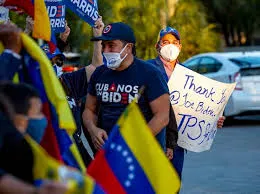
Impacts of Trump’s Decision to Revoke Venezuelan Deportation Protections
The Trump administration has revoked deportation protections for over 300,000 Venezuelans in the United States, affecting individuals who had previously been granted Temporary Protected Status (TPS). This decision reverses an 18-month TPS extension introduced during the final days of the Biden administration, which had safeguarded more than 600,000 Venezuelans fleeing political and economic turmoil under Nicolás Maduro’s regime.
As a result, Venezuelan immigrants who enrolled in the TPS program in 2023 now have 60 days before becoming vulnerable to deportation. Additionally, approximately 250,000 Venezuelans with TPS protections valid until September face an uncertain future. TPS is a federal program offering temporary refuge to individuals escaping natural disasters or armed conflicts but does not provide a pathway to long-term citizenship.
Homeland Security Secretary Kristi Noem justified the revocation by stating that Venezuela no longer meets the necessary conditions for TPS designation. This move has sparked protests and concerns both in Venezuela and the United States, particularly among Venezuelan exiles who had been strong supporters of President Trump in the 2024 elections.
In a related development, President Trump announced that Venezuela has agreed to accept the return of its citizens who entered the U.S. illegally, including members of the Tren de Aragua gang, known for criminal activities in cities like New York. This agreement follows a meeting between U.S. envoy Richard Grenell and Venezuelan leader Nicolás Maduro, during which six detained American citizens were released. Despite this arrangement, the Trump administration maintains its non-recognition of Maduro’s rule.
The revocation of TPS for Venezuelans aligns with the administration’s broader efforts to tighten immigration policies and reduce humanitarian programs like TPS. This decision has significant implications for Venezuelans who sought refuge in the U.S. from their country’s ongoing crises.